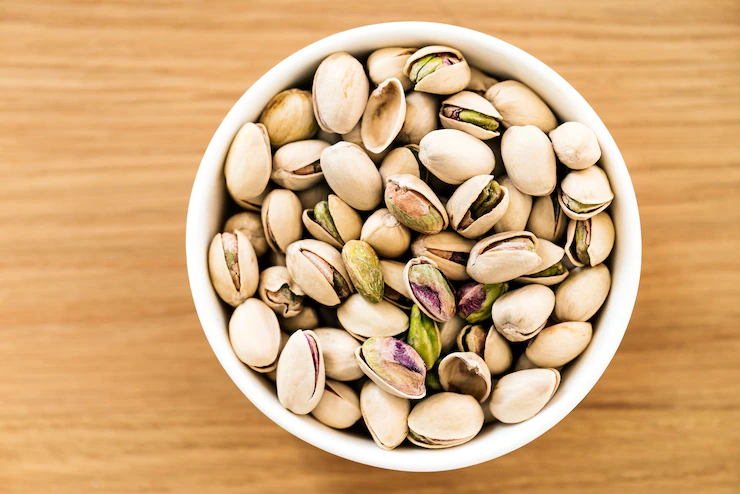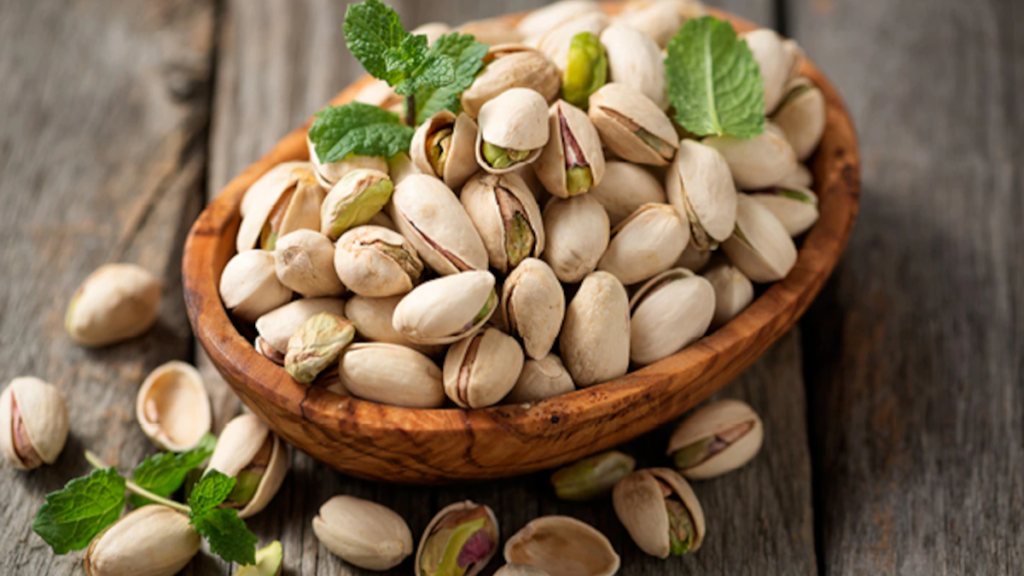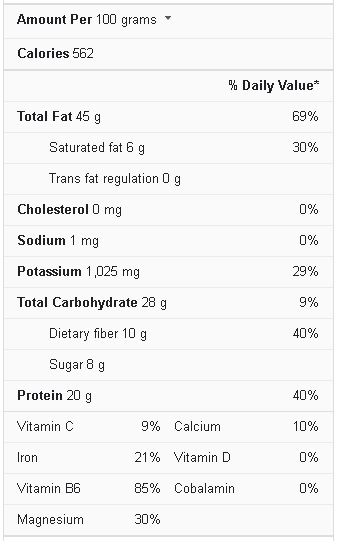Pistachios are nutrient-dense nuts that may be eaten as a healthy snack or included in a delectable meal. Pistachios are available in roasted, salted, flavored, or raw form, both in the shell (in-shell) and with the shell already removed (shelled). You might be wondering if pistachios are a harmful snack because of their high-fat content. The health-promoting lipids in this green nut, on the other hand, lower its glycemic index and increase its nutritious value. Pistachios have about 562 calories and 20 grams of protein per 100-gram serving. Pistachios are low in cholesterol and high in vitamins and minerals. To know pistachios nutrition facts, read further.
Pistachios can be used in almost any meal or snack, depending on how much you enjoy them and how creative you can be. It can be sprinkled over Greek yogurt, ground into a healthy pistachio-based garnish for fish, or baked with spices and citrus.
Pistachios Nutrition Facts
What are Pistachios?
The seeds of the pistachio tree are known as pistachios. They’re usually green and have a subtle sweetness to them. Pistachios are seeds, although they’re called nuts, and they’ve been consumed for thousands of years. The kernels come in various colors, ranging from yellow to green. They usually are approximately a half-inch in length and half-inch wide. However, if you wish to eat one, you must first crack open its hard shell.
The pistachio tree is thought to have originated in western Asia, and archaeologists estimate that pistachios were first eaten around 7,000 B.C. They arrived in the mid-nineteenth century in the United States, and commercial manufacturing began in the 1970s. America’s commercial pistachio production occurs in California, Arizona, and New Mexico. Pistachios are available shelled or unshelled, roasted or salted. They’re accessible in most grocery stores, and pistachio producers sell them in bulk.
What are the Health Benefits of Pistachios?
Including nuts in your diet is a tasty and nutritious method to energize your body. Nut eating has been linked to several health advantages.
Promotes Heart Health
Nut consumption has been linked to a lower risk of cardiovascular disease. Compared to a conventional Western diet, a moderate-fat diet containing pistachios reduced blood pressure and vascular resistance during acute stress, according to small research financed by the American Pistachio Growers. Pistachios are heart-healthy food due to their high phytosterol content. Phytosterols are derived from plants, but because they have a structure similar to cholesterol, they compete with cholesterol to prevent it from being absorbed.
Supports Healthy Weight Management
Polyphenols, abundant in nuts, have been linked to reducing obesity. The benefits of a Mediterranean diet rich in nuts, olives, fruits, vegetables, and whole grains for weight loss are well documented. Pistachios also take longer to eat than ready-to-eat items like potato chips or other processed snacks. Because you must crack open each shell before eating the nut, your body has a chance to register fullness before overeating.
Reduces Risk of Cancer
Pistachios have been researched to see whether they can help prevent colon cancer. “Diets with a higher consumption of nuts may be associated with a considerably lower risk of cancer recurrence and death in patients with stage III colon cancer,” according to a research of over 800 colon cancer patients monitored for several years. In this way, roasting pistachios does not affect their health advantages. Both raw and roasted types are thought to help prevent colon cancer.
Protects Eye Health
Pistachios receive their green color from lutein and zeaxanthin, which may aid in preventing age-related macular degeneration, according to a study. These antioxidants protect the eyes from cellular damage, ensuring that vision remains keen as time passes.
May Enhance Muscle Recovery
Pistachios have a more excellent essential amino acid ratio and a higher amount of branched-chain amino acids than other tree nuts (BCAAs). Branched-chain amino acids may help muscles recover faster after a workout. However, most studies have focused on branched-chain amino acid supplements rather than meals containing BCAAs, and the results have been mixed. According to the National Institutes of Health, insufficient evidence supports BCAA supplements in increasing athletic performance, muscular growth, or muscle recovery. However, consuming protein-rich diets boosts your consumption of BCAAs.
Is Eating Pistachios Everyday Good for You?
According to Jeffers, including nuts like pistachios in your daily diet is linked to a lower risk of death from cancer, heart disease, and lung disease. The Mediterranean diet includes pistachios and other nuts as a staple. Pistachios are a nutrient-dense food, and they provide several health advantages, particularly for the heart, intestines, and waistline. Consuming pistachios regularly may assist in improving one’s health and well-being. However, people should eat no more than 1 oz of plain, unsalted pistachio nuts in their shells each day.
How to Prepare Pistachios?
Pistachios can be eaten as a snack on their own, which is one of the simplest ways to enjoy them. They’re a great on-the-go snack because they don’t need to be refrigerated. You might also be interested in:
- Chopped pistachios to top yogurt or oatmeal
- In place of croutons as a crunchy topping for salads
- On a cheese or charcuterie board
- Paired with a piece of fruit for your afternoon snack (the combination of fiber, fat, and protein is very satisfying)
Pistachios are also a terrific addition to dishes since they add a pleasing crunch. Using pistachios instead of breadcrumbs as a crust for baked fish or poultry is a simple gluten-free solution. When it comes to crunchy treats, pistachios have a place at the table.
How to Store Pistachios?
Pistachios should be stored in an airtight container, whether in the shell or already shelled. They can be stored in this state for a year in the refrigerator or two years in the freezer. Because of their high-fat content, storing pistachios at room temperature causes them to grow rancid more quickly. Pistachios should only be kept at room temperature for a few months (less than that in warm weather). Raw pistachios can be stored in the refrigerator for a more extended period.
What are the Side Effects of Pistachios?
Even though pistachios are heavy in fat and calories, their fat is monounsaturated. This sort of fat can help reduce the risk of stroke by lowering low-density lipoproteins (LDL) or bad cholesterol. The American Heart Association (AHA) is a non-profit organization.
According to monounsaturated fat should make up the bulk of a person’s diet to lower the risk of cardiovascular disease. Pistachios should not affect a person’s weight if consumed in moderation. Buying shelled pistachios is one approach to keeping your pistachio intake in check. This can help people consume food more slowly, recognizing when they are complete and minimizing the danger of overeating.
Pistachios are a great food to have before working out because they release energy slowly. They include protein, which can aid muscle recovery after exercise. Pistachios are also abundant in vitamin E and other antioxidants, which may aid in protecting against cancer in some cases. They also contain resveratrol, a compound that has shown promise in treating Alzheimer’s and Parkinson’s disease.
However, such treatment is still in the early phases of development, and there is no evidence that eating pistachios can help lower the risk of these disorders or treat the symptoms.
Conclusion
Pistachios are a nutrient-dense food, and they provide several health advantages, particularly for the heart, intestines, and waistline. Consuming pistachios regularly may assist in improving one’s health and well-being. However, people should eat no more than 1 oz of plain, unsalted pistachio nuts in their shells each day. Weight loss decreased cholesterol and blood sugar, and improved gut, eye, and blood vessel health are all possible side effects. Besides being a great snack, pistachios can be used in baking and cooking, adding a green or purple color to various dishes.
They’re also tasty, adaptable, and entertaining to consume. Including pistachios in one’s diet is a terrific method to boost one’s overall health for most people. Pistachios should be avoided by people who have a tree nut allergy. Allergy symptoms usually appear within minutes, and if you have a bad reaction, you should consult your doctor. However, if the reaction becomes severe, known as anaphylaxis, it is a medical emergency that requires immediate attention. Whole nuts should be avoided by young children, the elderly, and those who have difficulty swallowing due to the risk of choking.



